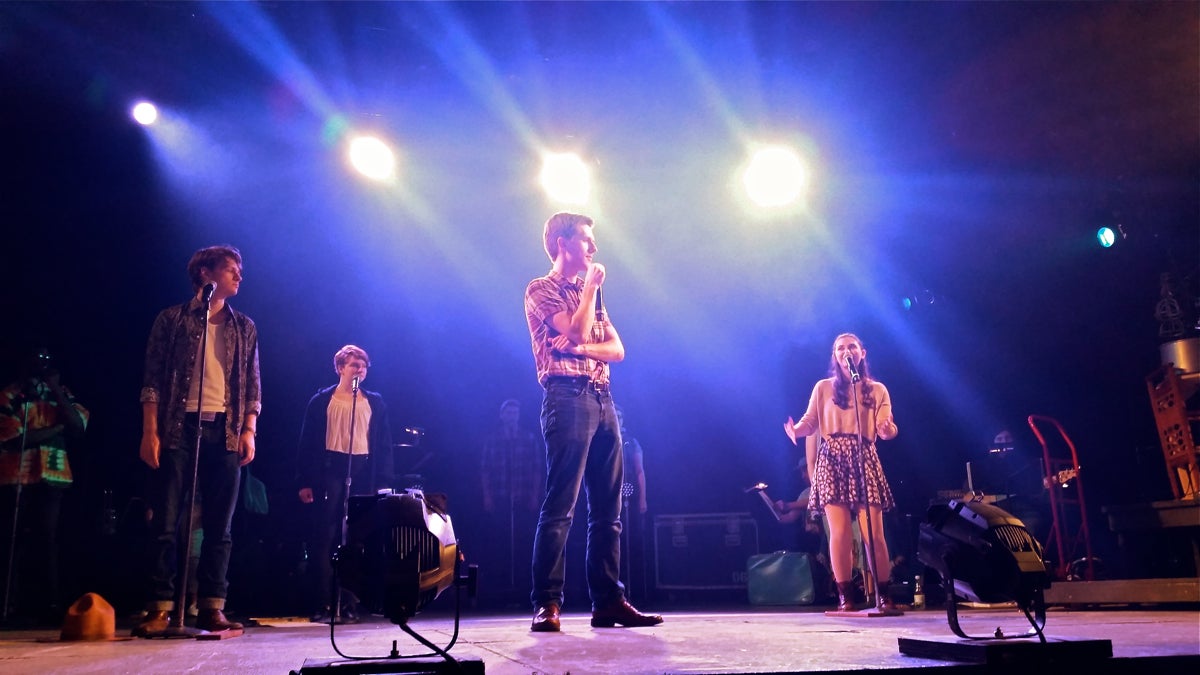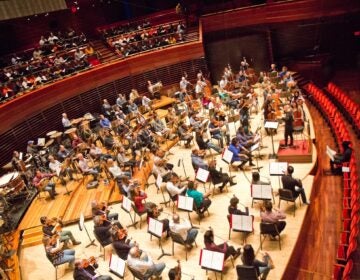Next ‘Hamilton’ may be among Polyphone Festival musical offerings
Listen
University of the Arts students Amanda Spivack (right) and William Shipley (center) rehearse ''Annie Salem: An American Tale.''(Peter Crimmins/WHYY)
The hottest ticket on Broadway right now is “Hamilton,” a historical musical about American Founding Father Alexander Hamilton, performed as rap.
“There’s not a stylistic requirement around what a musical is. However, Broadway has led us to believe there is,” said Cesar Alvarez, an artist in residence at the University of the Arts in Philadelphia. “Broadway has led us to believe there is a specific way to sing if you’re going to be in a musical. ‘Hamilton’ is incredible at blowing that apart.”
Alvarez is the artistic director of UArts Polyphone Festival, the second annual festival of new musical theater — some so new they are not finished yet.
Four musicals will be presented in concert format over the course of one week, each in various stages of development. There is a bluegrass musical set in Florida (“Finn the Fearless”), a grunge rock musical set in a bar in Prague (“Sometimes in Prague”), and a folk-pop family epic about socialist dogma and kabbalistic mysticism (“Material World”).
“Annie Salem: An American Tale” is a story of young love partially set on Earth, partially on Mars. The music is anchored by a massive drum kit resembling a junkyard, helmed by percussionist Eric Farber.
The first half, on Earth, takes its inspiration from the classic American songbook. The second act, on Mars, has a more conceptual sensibility, relying heavily on electronic noodling to weave sonic tapestries.
Composer Heather Christian said there is nothing traditional about “Annie Salem.”
“It’s not about writing songs and inserting scenes, and teaching people the music. This kind of thing exists off the page,” said Christian, who at rehearsal was still writing the martian portion of the musical. “It’s hard for me to figure out if I’m storytelling the music right, unless I have a full band and 10 voices to see if everything is happening.”
A fifth concert during the festival will be an older experiment that has become an American musical classic, “Chorus Line,” which the original writer and composer devised over seven months with full crew in rehearsal spaces.
Works in progress
None of the musicals in the Polyphone Festival will be full productions with costumes and sets. The will be presented as concert performances with actors off-book (having memorized their lines) at microphone stands backed by full orchestration.
The Polyphone festival is designed to be an opportunity for directors, writers, and composers to develop musicals that have not yet found their feet.
“They are in a weird, no-man’s land where a lot of musicals go to die,” said Alvarez. “What do you do after you have reading on music stands, and it’s still not figured out, and you don’t have your production yet?”
The first iteration of the festival last spring came together at the last minute when Alvarez and Joanna Settle, the director of UArts’ School of Theater, saw they could have the Merriam Theater on Broad Street for two weeks. Not wanting to waste the opportunity, they quickly devised a festival of experimental musicals.
“I mean real experimentation,” said Settle. “Something you are not sure is going to work. Or, if it’s going to work, you’re not sure how.”
Two of last year’s offerings will soon have their premiere productions. Stew and Heidi Rodewald’s “Total Bent” will be produced in May at New York’s Public Theater (directed by Settle) and Alvarez’s “Elementary Space Time Show” will premiere at the fall Fringe Festival in Philadelphia.
The festival priorities are learning experiences for students of UArts (80 theater students are actively participating in the weeklong festival) and for artists, who will have all the technical resources of UArts’ theater program at their disposal. The audience (there is a nominal $5 ticket price) is secondary, but a crucial part of the creative process.
“I don’t have to sell tickets. It’s a school, you know?” said Settle. “The measure of success in an educational environment is whether the participants in the experiment grew as a result of the experiment. The result is the development of the work and the progress of the artists. We’re trying to develop the medium.”
The Polyphone Festival will continue for one week, with one marathon day in which all four musicals will be presented back-to-back. Theater scouts from New York are expected to attend.
WHYY is your source for fact-based, in-depth journalism and information. As a nonprofit organization, we rely on financial support from readers like you. Please give today.





